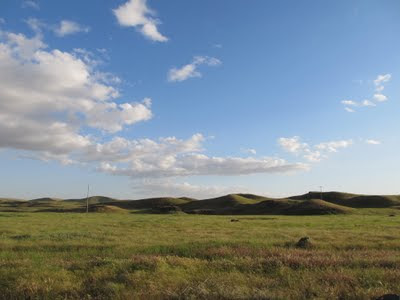Two years before that which radiochronologists by convention and archaeologists by custom deemed "the present" (1950), E. Blair a.k.a. G. Orwell finished a novel imagined to occur 36 years after publication, thus determining the year in which Apple would unleash its brand upon the PC market.
You with me so far?
Good. It's been three-cubed years since 1984 now, and things have changed. Things have stayed the same. For one thing, I am absolutely sure that I recently read
1984. I was supposed to in high school, but may have shirked. May have read something else, been tired, or listened to Death Piggy instead. Or hung out with my girlfriend. Or something.
Hard to say, what with the past being so over and inaccessible, tossed into the memory hole and all. In
1984 the Party revised the past, trying to control the future. In 1984, the year after I graduated high school, post-modernism had made the journey from France to the US, from oxymoron to paradigm, and the past was reduced to contested construct, and the future was bright for madmen, and scary for the rest of us. We truly sat on the brink. Of what, who knows for sure? Thermonuclear war, unending prosperity, a New World Order,...something more ambivalent?
Yes, ambivalent. The only sure thing.
What we were on the brink of was full-on computer revolution. Mac promised freedom, and delivered tactically, but may have granted that old mustachioed Brother of ours a durable strategic advantage. Conceivably: immortality. Not that Apple invented everything, or even everything cool. It's just that by designing computers that we want in our homes, that we can interact with more humanly, they managed to insert the telescreen into our homes. I sit here now with a camera aimed at me that could be visible to a hacker anywhere. Could be someone just having fun looking in on random strangers. Could be a criminal. Could be a state (worse yet, corporate) security apparatus. Could be Big Brother his own damn self. Whoever it is, I love you.
And also, please don't put a bullet in my head. Or anywhere else for that matter.
But it's different than a telescreen, having a computer. For one thing, I can turn it off, or defeat the camera with a folded business card, or write bullshit, as I am wont to do. The web has allowed images of brutal repression to be seen, which may do some good, living up to the now ironic "1984" Apple commercial. More so in Egypt than in Syria or Bahrain, maybe. News flourished, then diluted, become motes on the broad horizon of information we can now perceive.
And there's always that potential for the device to go from convenience to spy. Maybe I value my privacy more than most, I know for sure that there are many people willing to carry a GPS-enabled phone, web-ready, its blue tooth bit into every little wi-fi cookie offered. Not just for whatever hacker may be bored enough to look at, but for everyone on facebook,...twits.
Few of them are being spied on for any purpose other than to pitch the right ads at them, but nearly all are willing to sacrifice actual interaction to fritter their opposable thumbs away on ether. Stuck in Apple's GUI, playing with cool apps, wallowing in irony, being cool. Not revolutionizing, just thinking that the Arab in the street has a cool shirt showing a guy screaming in protest, unaware that the image was lifted from an Israeli kid, posted more or less randomly online.
You still with me?
I'm not, to be honest. It was something about the past being sketchy, then Big Brother watching, or something. Post-modernists stepped in where Stalinists failed, and to be honest (if such a thing still be possible), despite recent setbacks, the P-Ms still hold enough sway that I can claim to be confused because of them, because of confusion in general as a condition of 21st Century American culture, and not be held responsible for having not fully read the book, or understood the terms of agreement that flashed before me before my thumb hit click and launched me into personal computing, gateway drug to the web, delivered thus unto whatever spiders lurk there.





















